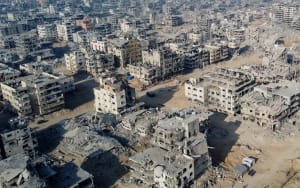Israel’s Dead Sea potash resource

If ever there was a country through which providence is demonstrated, it would be Israel. Despite its small size and seemingly sparse resources, the reinstated nation has ample resources by 21st century standards. Israel Chemicals Ltd. (ICL Group) produces commodities such as potash (potassium fertilizer) from minerals extracted from the Dead Sea [1]. The Dead Sea is a globally unique natural phenomenon; it is the lowest surface elevation on Earth and the world’s deepest hypersaline lake [2]. As the Dead Sea has no outflow, there is an excessive accumulation of salts while influx water is steadily removed by evaporation, resulting in nearly 10 times the salinity level of the ocean [2]. Evaporation is enhanced by desert conditions and regional geography, such that the Dead Sea waters heated during the day interact at the surface with cool dry winds through the Jordan Rift Valley at night. Potassium is one of the three essential plant nutrients, along with nitrogen and phosphorous, in the growing of wholesome foods.
History
Moshe Novomeysky, a Jewish mining engineer from Siberia, developed the process for extracting the potassium-bearing salt known as carnallite from the Dead Sea [3]. Moshe established the Palestine Potash Company, which in the 1930s began producing potash from carnallite at two production plants [4]. In 1948 both plants were destroyed during Israel’s War of Independence [4]. It was in 1955 that Dead Sea Works Ltd. began the same process of potash production, increasing capacity with expansions over subsequent years [3]. Dead Sea Works Ltd. was consolidated with ICL Group in 1975 [5]. As of 2018, ICL Group has its own natural gas power plant for production operations [6].
Processing
ICL’s concession area at the southern basin of the Dead Sea encompasses 150 evaporation ponds [7]. In the potash production process, water from the Dead Sea is pumped into a series of shallow evaporation ponds. As water evaporates, the concentration of salts increases to the point of saturation, when salt precipitation (crystallization) occurs. Of the three salts involved, gypsum reaches saturation point first, then sodium chloride. Once these salts have precipitated, the remaining water is pumped to a second evaporation pond for precipitation and storage of carnallite. The carnallite is pumped as slurry to the manufacturing plant [3] and processed, using cold crystallization and hot leaching, into potash [8]. Overall, the process is among the world’s most efficient at extraction and production [7]. Two types of potash are produced: fine grade used for direct fertilizer application or granulation, and compacted (granulated) grade used for direct fertilizer application or blending [9].
Biblical Perspective
Interestingly, there is a connection with the familiar Old Testament account of Sodom and Gomorrah. In Genesis 13:10, before the destruction of Sodom and Gomorrah, the plain of the Jordan is described as having been like the garden of the Lord. As recorded in Genesis 19:25, there was judgement not just on those cities, but the entire plain and all that grew on the ground. What once constituted the lush flora and fertile ground, either went up in smoke, or turned to salty ash and drained into the Dead Sea. The principle is that though destroyed by judgement, the basic elements persisted and were available to be utilized at the right time for Israel. It is articles like this one that can describe how Israel has become prosperous in the 21st century, providentially with natural resources of old.
References
[1] Szczesniak, P. A. The Mineral Industry of Israel. In: USGS 2019 Minerals Yearbook. U.S. Geological Survey.
[2] Meiburg, E. and N. G. Lensky. 2025. Fluid Mechanicals of the Dead Sea. Annual Review of Fluid Mechanics 57: 167-196.
[3] Wisniak, J. 2002. The Dead Sea–A live pool of chemicals. Indian Journal of Chemical Technology 9: 79-87.
[4] Nissenbaum, A. 1993. The Dead Sea – an economic resource for 10 000 years. Hydrobiologia 267: 127-141.
[5] Semiat, R., and E. Frangenbeg. 2015. Israel’s Chemicals Industry: From the Desert to the Dead Sea. Chemical Engineering Progress 111(10): 36-42.
[6] Israel Chemicals Ltd. (ICL). 2018. Launch of ICL’s New Power Plant in Sodom.
[7] ICL Group Ltd. Corporate Responsibility ESG 2023.
[8] ICL Group Ltd. Annual Report For the Period Ended December 31, 2023.
[9] Weidberg, R. 2011. Calculation of Carbon Footprint of Potash at Dead Sea Works, Israel. Electronic International Fertilizer Correspondent 29: 28-30

Josh Bowditch is an aspirer of stewardship in the Biblical sense. This includes ascertaining the truth and writing concisely about topics of interest.
You might also like to read this:

















